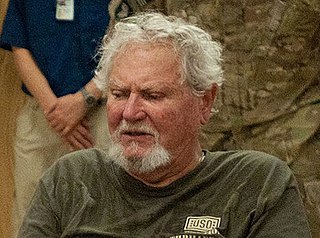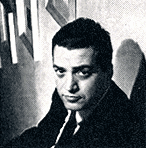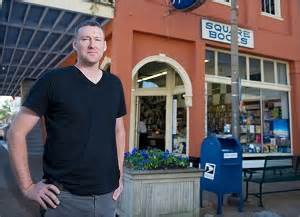A Quote by Ron Currie Jr.
I'm definitely excited by big ideas, both in what I write and what I read. Most days, reality is so mind-numbingly dull that I don't understand why someone would write strictly realistic stories, given the almost limitless freedom fiction provides. I don't see the point of making believe if you're not going to actually make believe: hang your ass out in the wind, push at every boundary, make almost unreasonable demands on your reader's willingness to suspend disbelief. This is dangerous, and prone to failure, but that's part of what makes it fun.
Quote Topics
Actually
Almost
Ass
Believe
Big
Big Idea
Big Ideas
Both
Boundary
Dangerous
Days
Definitely
Demands
Disbelief
Dull
Every
Excited
Failure
Fiction
Freedom
Fun
Given
Going
Hang
Ideas
Limitless
Make
Make Believe
Makes
Making
Mind
Most
Out
Part
Point
Prone
Provides
Push
Read
Reader
Realistic
Reality
See
Someone
Stories
Strictly
Suspend
Understand
Unreasonable
Why
Willingness
Wind
Would
Write
Your
Related Quotes
The desire to be liked is acceptable in real life but very problematic in fiction. Pleasantness is the enemy of good fiction. I try to write on the premise that no one is going to read my work. Because there's this terrible impulse to grovel before the reader, to make them like you, to write with the reader in mind in that way. It prevents you doing work that is ugly or upsetting or difficult. The temptation is to not be true to what you want to write and to be considerate or amusing instead. I'm always trying to fight against the impulse to make my readers like me.
Believe me, I know and I almost made the same mistake you did. Evil is seductive. It’s what makes the two of them so dangerous. (Jericho) No. It’s our willingness to believe their lies and to see what we want to see that makes it so dangerous. Even when we know better, we lie to ourselves and that’s where the true betrayal is. (Jared)
You see, writing down your meanderings gets something started deep in the recesses of your brain. That distant part of your mind knows that you want to write stories or poems or plays and not endless jabber, and it will get to work. It may take a while. You may have to write this stuff for hours or days or weeks, but eventually that subterranean part of your brain will come through and begin to send you ideas.
If only you’d remember before ever you sit down to write that you’ve been a reader long before you were ever a writer. You simply fix that fact in your mind, then sit very still and ask yourself, as a reader, what piece of writing in all the world Buddy Glass would most want to read if he had his heart’s choice. The next step is terrible, but so simple I can hardly believe it as I write it. You just sit down shamelessly and write the thing yourself. I won’t even underline that. It’s too important to be underlined.
I have spent a good many years since?too many, I think?being ashamed about what I write. I think I was forty before I realized that almost every writer of fiction or poetry who has ever published a line has been accused by someone of wasting his or her God-given talent. If you write (or paint or dance or sculpt or sing, I suppose), someone will try to make you feel lousy about it, that's all.
Making fiction for children, making books for children, isn't something you do for money. It's something you do because what children read and learn and see and take in changes them and forms them, and they make the future. They make the world we're going to wind up in, the world that will be here when we're gone. Which sounds preachy (and is more than you need for a quotebyte) but it's true. I want to tell kids important things, and I want them to love stories and love reading and love finding things out. I want them to be brave and wise. So I write for them.
I plot as I go. Many novelists write an outline that has almost as many pages as their ultimate book. Others knock out a brief synopsis... Do what is comfortable. If you have to plot out every move your characters make, so be it. Just make sure there is a plausible purpose behind their machinations. A good reader can smell a phony plot a block away.
I had a lot of great lakes of ignorance that I was up against, I would write what I knew in almost like islands that were rising up out of the oceans. Then I would take time off and read, sometimes for months, then I would write more of what I knew, and saw what I could see, as much as the story as I could see. And then at a certain point I had to write out what I thought was the plot because it was so hard to keep it all together in my head. And then I started to write in a more linear way.
I'm a compulsive reader of fiction. I fell in love with novels when I was a teenager. My wife Marilyn and I... our initial friendship began because we are both readers. I've gone to sleep almost every night of my life after having read in a novel for 30 or 40 minutes. I'm a great reader of fiction and much less so of non-fiction.
It's been suggested that most women fail to write significantly because the female mind is viscerotonic, and occupied almost exclusively with the moment-to-moment reality of emotions. If this is true, literature's loss is science fiction's gain, for Out of Bounds, Judith Merril's collection of short stories, is a warm and colorful rendering of the minutiae of the future.
I don't think about the reader in any conscious way that impacts the writing, as far as, Hey, most readers would like this! But at the same time, if it were presented to me: "John, you're going to write a novel. It's going to take you a few years. When you're done with it, there's a law that no one's allowed to read it." I don't think I would write it. I want someone to read it!
When I write this in bed, I can almost hear the echo of the wind over the sand, or the groans of wooden panels around me. I can almost smell the dustiness of the camel, taste the bitterness of saltbush. And when I dream, your warm hands cover my shoulders. Your whispers carry stories and sound like the rustle of spinifex. I still wear that ring, you know... at night, when no one is watching.

































